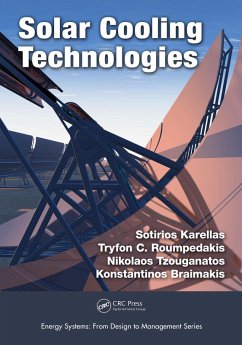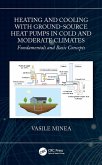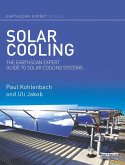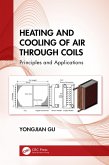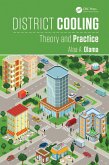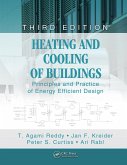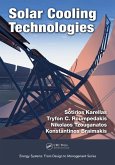Sotirios Karellas, Tryfon C Roumpedakis, Nikolaos Tzouganatos, Konstantinos Braimakis
Solar Cooling Technologies (eBook, PDF)
49,95 €
49,95 €
inkl. MwSt.
Sofort per Download lieferbar

25 °P sammeln
49,95 €
Als Download kaufen

49,95 €
inkl. MwSt.
Sofort per Download lieferbar

25 °P sammeln
Jetzt verschenken
Alle Infos zum eBook verschenken
49,95 €
inkl. MwSt.
Sofort per Download lieferbar
Alle Infos zum eBook verschenken

25 °P sammeln
Sotirios Karellas, Tryfon C Roumpedakis, Nikolaos Tzouganatos, Konstantinos Braimakis
Solar Cooling Technologies (eBook, PDF)
- Format: PDF
- Merkliste
- Auf die Merkliste
- Bewerten Bewerten
- Teilen
- Produkt teilen
- Produkterinnerung
- Produkterinnerung

Bitte loggen Sie sich zunächst in Ihr Kundenkonto ein oder registrieren Sie sich bei
bücher.de, um das eBook-Abo tolino select nutzen zu können.
Hier können Sie sich einloggen
Hier können Sie sich einloggen
Sie sind bereits eingeloggt. Klicken Sie auf 2. tolino select Abo, um fortzufahren.

Bitte loggen Sie sich zunächst in Ihr Kundenkonto ein oder registrieren Sie sich bei bücher.de, um das eBook-Abo tolino select nutzen zu können.
Book presents a detailed study of the potential technologies for coupling solar energy and cooling systems. It starts with the theoretical background on the refrigeration cycles and their thermodynamic analysis followed by description of different technologies for solar cooling.
- Geräte: PC
- mit Kopierschutz
- eBook Hilfe
- Größe: 49.96MB
Andere Kunden interessierten sich auch für
![Heating and Cooling with Ground-Source Heat Pumps in Cold and Moderate Climates (eBook, PDF) Heating and Cooling with Ground-Source Heat Pumps in Cold and Moderate Climates (eBook, PDF)]() Vasile MineaHeating and Cooling with Ground-Source Heat Pumps in Cold and Moderate Climates (eBook, PDF)51,95 €
Vasile MineaHeating and Cooling with Ground-Source Heat Pumps in Cold and Moderate Climates (eBook, PDF)51,95 €![Solar Cooling (eBook, PDF) Solar Cooling (eBook, PDF)]() Paul KohlenbachSolar Cooling (eBook, PDF)41,95 €
Paul KohlenbachSolar Cooling (eBook, PDF)41,95 €![Heating and Cooling of Air Through Coils (eBook, PDF) Heating and Cooling of Air Through Coils (eBook, PDF)]() Yongjian GuHeating and Cooling of Air Through Coils (eBook, PDF)119,95 €
Yongjian GuHeating and Cooling of Air Through Coils (eBook, PDF)119,95 €![District Cooling (eBook, PDF) District Cooling (eBook, PDF)]() Alaa A. OlamaDistrict Cooling (eBook, PDF)171,95 €
Alaa A. OlamaDistrict Cooling (eBook, PDF)171,95 €![Heating and Cooling of Buildings (eBook, PDF) Heating and Cooling of Buildings (eBook, PDF)]() T. ReddyHeating and Cooling of Buildings (eBook, PDF)181,95 €
T. ReddyHeating and Cooling of Buildings (eBook, PDF)181,95 €![Solar Cooling Technologies (eBook, ePUB) Solar Cooling Technologies (eBook, ePUB)]() Sotirios KarellasSolar Cooling Technologies (eBook, ePUB)49,95 €
Sotirios KarellasSolar Cooling Technologies (eBook, ePUB)49,95 €![Testing and Balancing HVAC Air and Water Systems (eBook, PDF) Testing and Balancing HVAC Air and Water Systems (eBook, PDF)]() Samuel C. SugarmanTesting and Balancing HVAC Air and Water Systems (eBook, PDF)130,95 €
Samuel C. SugarmanTesting and Balancing HVAC Air and Water Systems (eBook, PDF)130,95 €-
-
-
Book presents a detailed study of the potential technologies for coupling solar energy and cooling systems. It starts with the theoretical background on the refrigeration cycles and their thermodynamic analysis followed by description of different technologies for solar cooling.
Dieser Download kann aus rechtlichen Gründen nur mit Rechnungsadresse in A, B, BG, CY, CZ, D, DK, EW, E, FIN, F, GR, HR, H, IRL, I, LT, L, LR, M, NL, PL, P, R, S, SLO, SK ausgeliefert werden.
Produktdetails
- Produktdetails
- Verlag: Taylor & Francis eBooks
- Seitenzahl: 463
- Erscheinungstermin: 3. Oktober 2018
- Englisch
- ISBN-13: 9781351670401
- Artikelnr.: 54026431
- Verlag: Taylor & Francis eBooks
- Seitenzahl: 463
- Erscheinungstermin: 3. Oktober 2018
- Englisch
- ISBN-13: 9781351670401
- Artikelnr.: 54026431
- Herstellerkennzeichnung Die Herstellerinformationen sind derzeit nicht verfügbar.
Sotirios Karellas is an Associate Professor at the School of Mechanical Engineering of National Technical University of Athens (NTUA), visiting Professor at the Technische Universität München and at the Universität Bayreuth in Germany, specialist on energy systems, energy storage, solar-thermal energy, biomass, ORC technology, decentralized energy systems, heat pumps, and tri-generation systems. He has over 100 relevant publications in scientific Journals and Conferences. He is currently supervising 6 Ph.D. students at NTUA working in the field of energy production/conversion. He has participated in a high number of projects in NTUA (2006-present) and in Technische Universität München (2001-2006), having both technical and coordination responsibilities. He has significant industrial experience in power production plants, co/tri-generation systems, heat pumps and chillers. He is full member of the editorial board of 5 scientific journals dealing with energy systems and renewable energy sources.
Tryfon C. Roumpedakis is a M.Sc. Mechanical Engineer. He graduated from the School of Mechanical Engineering of the National Technical University of Athens, Greece, in 2014. In 2016 completed his Master studies in Power Production and Management, in School of Electrical Engineering of National Technical University of Athens. At the time, is on due to pursue his second master degree in Mechanical Engineering (specialization of Sustainable Processes and Energy Technologies) in TU Delft, Netherlands. During 2014-2015 he had been working in the laboratory of Steam Boilers and Thermal Plants of the National Technical University of Athens as a research engineer, where at the moment is collaborating as an external associate in projects relevant to his specialization. His main fields of expertise are Organic Rankine Cycle and Refrigeration technologies.
Nikolaos Tzouganatos received his M.Eng. degree from the Dept. of Mechanical Engineering of the National Technical University of Athens in 2010 and his M.Sc. degree in Energy Science & Technology from ETH Zurich in 2012. In October 2016, he received his Ph.D. degree from the Dept. of Mechanical and Process Engineering of ETH Zurich. He performed his doctoral research at the Solar Technology Laboratory of the Paul Scherrer Institute, Switzerland in the field of solar thermochemistry and, particularly, on solar reactor development for zinc recycling and other metallurgical processes. Part of his work has been performed in close collaboration with the Commonwealth Scientific & Industrial Research Organisation (CSIRO) during his research visit at the National Solar Energy Centre in Newcastle, Australia in 2014.
Tryfon C. Roumpedakis is a M.Sc. Mechanical Engineer. He graduated from the School of Mechanical Engineering of the National Technical University of Athens, Greece, in 2014. In 2016 completed his Master studies in Power Production and Management, in School of Electrical Engineering of National Technical University of Athens. At the time, is on due to pursue his second master degree in Mechanical Engineering (specialization of Sustainable Processes and Energy Technologies) in TU Delft, Netherlands. During 2014-2015 he had been working in the laboratory of Steam Boilers and Thermal Plants of the National Technical University of Athens as a research engineer, where at the moment is collaborating as an external associate in projects relevant to his specialization. His main fields of expertise are Organic Rankine Cycle and Refrigeration technologies.
Nikolaos Tzouganatos received his M.Eng. degree from the Dept. of Mechanical Engineering of the National Technical University of Athens in 2010 and his M.Sc. degree in Energy Science & Technology from ETH Zurich in 2012. In October 2016, he received his Ph.D. degree from the Dept. of Mechanical and Process Engineering of ETH Zurich. He performed his doctoral research at the Solar Technology Laboratory of the Paul Scherrer Institute, Switzerland in the field of solar thermochemistry and, particularly, on solar reactor development for zinc recycling and other metallurgical processes. Part of his work has been performed in close collaboration with the Commonwealth Scientific & Industrial Research Organisation (CSIRO) during his research visit at the National Solar Energy Centre in Newcastle, Australia in 2014.
1.Introduction. 2.Thermodynamic Cycles for Solar Cooling. 3.Solar thermal
collectors. 4.Photovoltaic driven heat pumps. 6.Adsorption cooling heat
pumps. 7.Alternative and hybrid cooling systems. 8.Trigeneration systems.
9.Solar desiccant cooling. 10.Thermal energy storage. 11.Economic
evaluation of solar cooling technologies.
collectors. 4.Photovoltaic driven heat pumps. 6.Adsorption cooling heat
pumps. 7.Alternative and hybrid cooling systems. 8.Trigeneration systems.
9.Solar desiccant cooling. 10.Thermal energy storage. 11.Economic
evaluation of solar cooling technologies.
1.Introduction. 2.Thermodynamic Cycles for Solar Cooling. 3.Solar thermal
collectors. 4.Photovoltaic driven heat pumps. 6.Adsorption cooling heat
pumps. 7.Alternative and hybrid cooling systems. 8.Trigeneration systems.
9.Solar desiccant cooling. 10.Thermal energy storage. 11.Economic
evaluation of solar cooling technologies.
collectors. 4.Photovoltaic driven heat pumps. 6.Adsorption cooling heat
pumps. 7.Alternative and hybrid cooling systems. 8.Trigeneration systems.
9.Solar desiccant cooling. 10.Thermal energy storage. 11.Economic
evaluation of solar cooling technologies.
